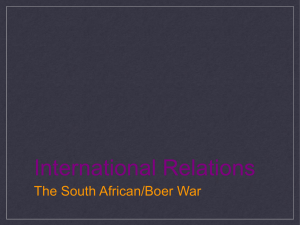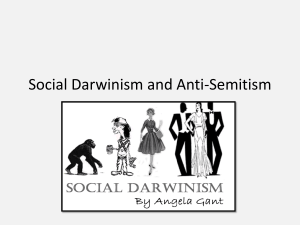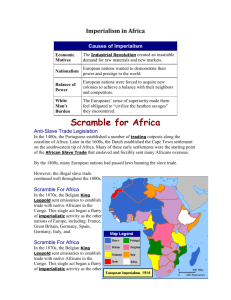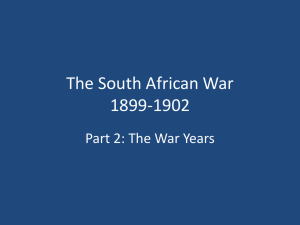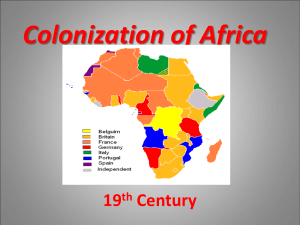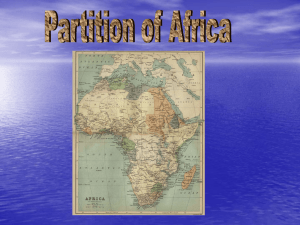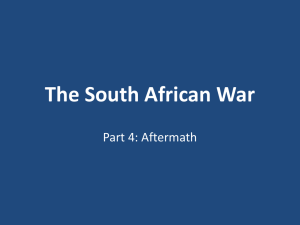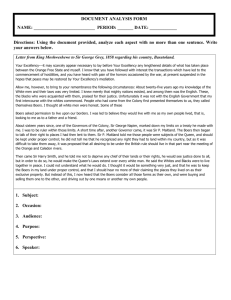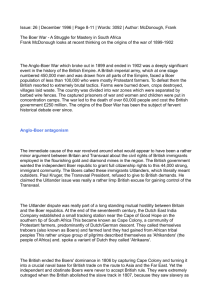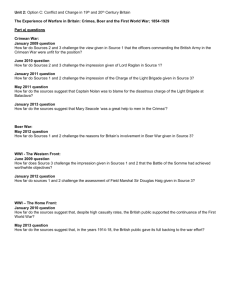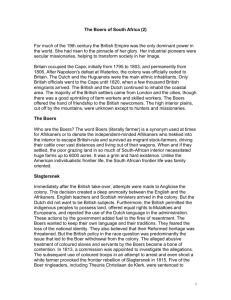How far do you agree that the protection of Uitlander rights in the
advertisement
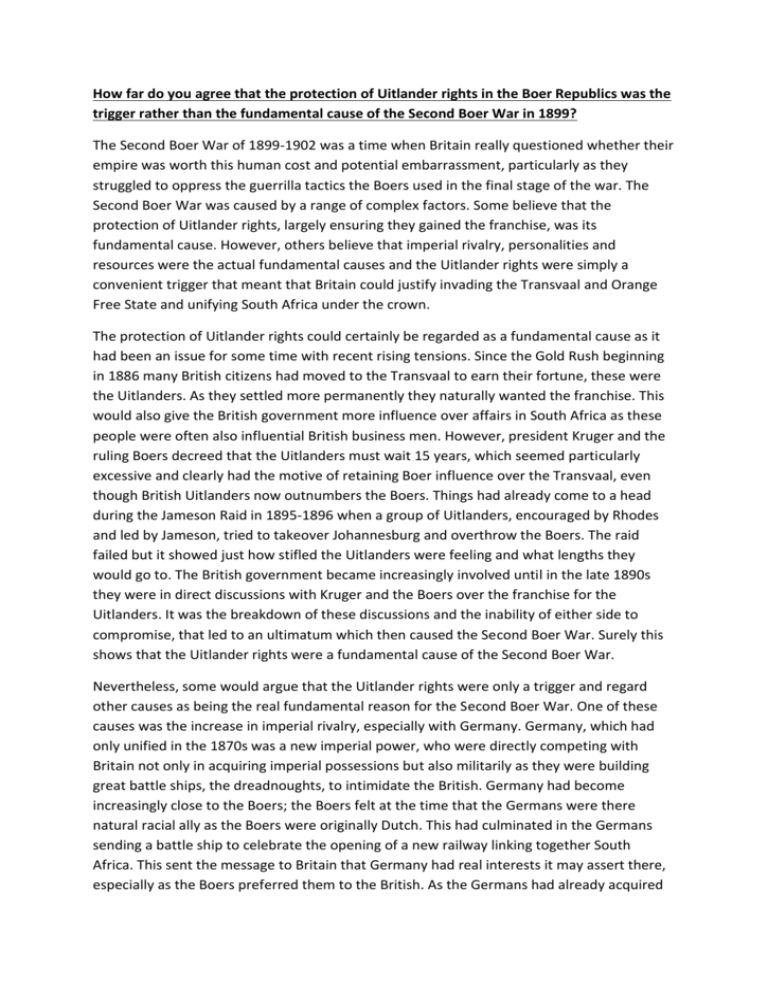
How far do you agree that the protection of Uitlander rights in the Boer Republics was the trigger rather than the fundamental cause of the Second Boer War in 1899? The Second Boer War of 1899-1902 was a time when Britain really questioned whether their empire was worth this human cost and potential embarrassment, particularly as they struggled to oppress the guerrilla tactics the Boers used in the final stage of the war. The Second Boer War was caused by a range of complex factors. Some believe that the protection of Uitlander rights, largely ensuring they gained the franchise, was its fundamental cause. However, others believe that imperial rivalry, personalities and resources were the actual fundamental causes and the Uitlander rights were simply a convenient trigger that meant that Britain could justify invading the Transvaal and Orange Free State and unifying South Africa under the crown. The protection of Uitlander rights could certainly be regarded as a fundamental cause as it had been an issue for some time with recent rising tensions. Since the Gold Rush beginning in 1886 many British citizens had moved to the Transvaal to earn their fortune, these were the Uitlanders. As they settled more permanently they naturally wanted the franchise. This would also give the British government more influence over affairs in South Africa as these people were often also influential British business men. However, president Kruger and the ruling Boers decreed that the Uitlanders must wait 15 years, which seemed particularly excessive and clearly had the motive of retaining Boer influence over the Transvaal, even though British Uitlanders now outnumbers the Boers. Things had already come to a head during the Jameson Raid in 1895-1896 when a group of Uitlanders, encouraged by Rhodes and led by Jameson, tried to takeover Johannesburg and overthrow the Boers. The raid failed but it showed just how stifled the Uitlanders were feeling and what lengths they would go to. The British government became increasingly involved until in the late 1890s they were in direct discussions with Kruger and the Boers over the franchise for the Uitlanders. It was the breakdown of these discussions and the inability of either side to compromise, that led to an ultimatum which then caused the Second Boer War. Surely this shows that the Uitlander rights were a fundamental cause of the Second Boer War. Nevertheless, some would argue that the Uitlander rights were only a trigger and regard other causes as being the real fundamental reason for the Second Boer War. One of these causes was the increase in imperial rivalry, especially with Germany. Germany, which had only unified in the 1870s was a new imperial power, who were directly competing with Britain not only in acquiring imperial possessions but also militarily as they were building great battle ships, the dreadnoughts, to intimidate the British. Germany had become increasingly close to the Boers; the Boers felt at the time that the Germans were there natural racial ally as the Boers were originally Dutch. This had culminated in the Germans sending a battle ship to celebrate the opening of a new railway linking together South Africa. This sent the message to Britain that Germany had real interests it may assert there, especially as the Boers preferred them to the British. As the Germans had already acquired Tanganyika (on the Northern border of the Transvaal) and areas of modern day Namibia Britain were worried that Germany may try to unite a great influence over South Africa, especially under the intentions of Bismark who wanted to make Germany incredibly strong. This problem was exacerbated by the resources which were in South Africa, largely the diamond mines in Kimberley and the Gold in the Witwatersrand. Clearly the British wanted to retain influence over this, especially as it had been British money that built these mines, whilst the Germans also wanted access to this promise of resources. It would appear that these were the actual fundamental reasons and that the British government remained so steadfast in their negotiations over the Uitlander franchise as they wanted to go to war with the Boers and establish a direct influence to ensure Germany did not fulfil this role. Furthermore, it would seem that Uitlander rights were only a triggering factor, as the role of personalities became fundamental causes of the Second Boer War. Cecil Rhodes, who was an extremely successful businessman in South Africa, directly agitated for the Uitlander votes, especially in his role as Prime Minister of the Cape. It was him who pushed Britain and the Uitlanders towards war. Kruger also had an important role, as president of the Transvaal he was known to be particularly stubborn and intransigent. It was his lack of negotiation on any issues which led the British government to believe that the only way to gain what they wanted was by direct action. Finally, Milner, who was the British Commissioner of South Africa had a huge role. He was a very strong imperialist who wanted South Africa to come completely under British control. It was him who led the negotiations and delivered the ultimatum. However, he wanted the ultimatum to be refused so that Britain could take South Africa by force, whereas Chamberlain (the colonial secretary) hoped that the ultimatium would nudge Kruger back to the negotiation table to grant the Uitlanders the franchise after a shorter period of time. The fact that Milner had his own agenda and he was leading the negotiations suggests that he, as well as the stubborn Kruger, had a strong role in forcing the British and Boers into war. In conclusion it would seem that Uitlander rights were a fundamental cause of the Second Boer War, as this was what had become the issue of the negotiations, drove the breaking of the ultimatum, made the new natural resources such an issue, and caused Rhodes, Kruger and Milner to stick so steadfastly to their views. Imperial rivalry and the appeal of new natural resources were another fundamental cause. It would be treating Uitlander rights to lightly to simply regard them as only a trigger for the Second Boer War.

